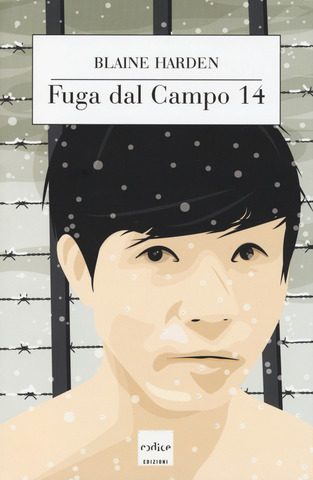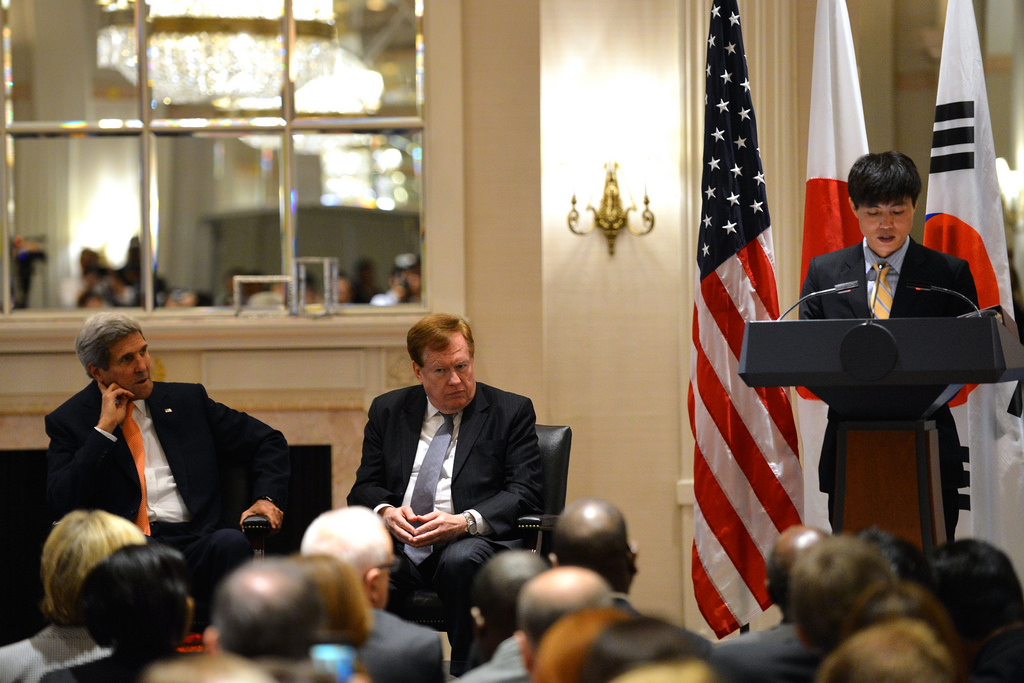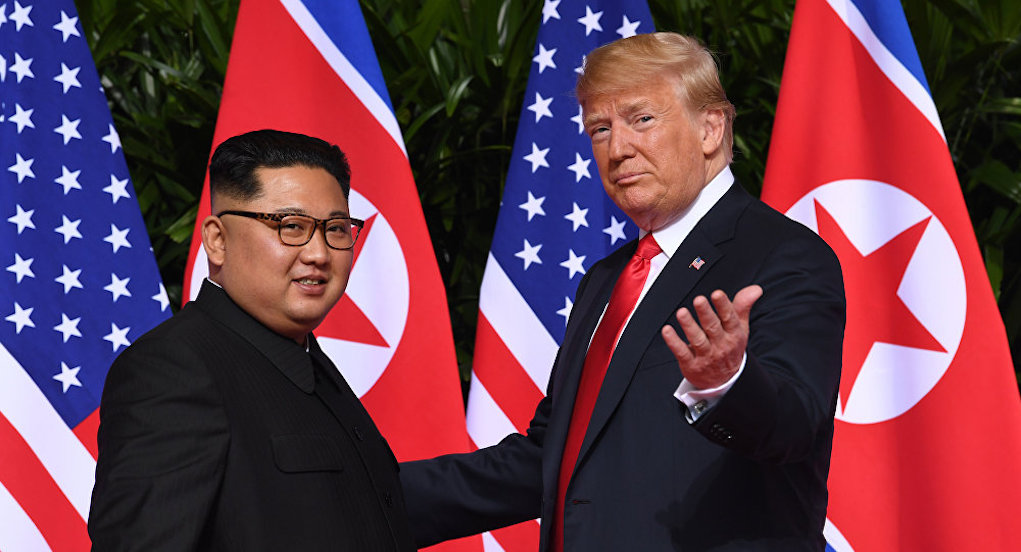An important witness of the atrocities committed in North Korea, he convinced the UN to set up a commission of inquiry to condemn the Stalinist dictatioral regime established 70 years ago by the Kim dynasty.
“I was born in a prison camp in North Korea so before my escape from the camp twelve years ago, I had no idea what was on the other side of the barbed wire that separated me from the rest of the world. If it hadn’t been for a political prisoner named Park who, unlike me, had travelled the world and had intrigued me with his tales of delicious dishes, I am sure I would never have found the courage to push myself so far and to make a detailed escape plan, with his help, to eventually cross the border into China. My obsession to taste the dishes he described gave me my freedom”. This is how my exclusive interview for The Voice of New York with Shin Dong Hyuk, one of the main characters, symbol of the fight for human rights in North Korea, began.

He began talking and there was no stopping him for practically the next two hours. He told me about his old life and his new life, sighing occasionally while he reflected … he still finds it hard to believe he managed to escape; it is like a dream to him. He describes a life of harassment, torture and prohibition of every kind. Even picking an apple up off the ground without permission from the guards, could be motive for the infliction of a heavy punishment. One needed to ask for permission just to survive in the camp. His survival of the horrors of that prison camp forgotten by the world and maybe even God has given him the strength, courage and determination to carry on with his commitment.
In recent years he has dedicated his time to informing the world about the disastrous situation in North Korea, speaking to the Assembly of the United Nations as spokesman for the rights of those who are weaker and unable to speak up for themselves. He has participated in numerous conferences in various countries around the world and has been interviewed by Morgan Freeman and before that, the American journalist Blaine Harden had involved him in the drafting of his biography “Escape From Camp 14” in which Shin tells of what he remembers of his life in every minimum detail going back to when he was born.
Twenty-three years of suffering, of hunger and injustice getting to the point of bearing the unbearable, suffering what common mortals would have difficulty imagining, his body still bearing the scars of those never ending years. His blood curdling story goes beyond every arduous imagination, but he won, won despite everything, despite having witnessed the death of his mother and elder brother in those cursed camps, he won because he never gave up and because today he continues to be the voice of those who have no voice.

How did you imagine the world on the other side of the barbed wire?
“In reality I did not imagine it at all, I had never heard of it, my life was made up of a daily routine full of hunger, forced labour and torture that did not leave much room for imagination and not being able to make a comparison, I was unable to even desire freedom, a word of which I understood the meaning only after having touched it. The education I had been given in the camp had the exclusive purpose of creating distrust and doubts. What we were taught to do better than anything else was how to spy on the other prisoners, reporting them whenever we saw them whispering or stealing even a grain of rice. You could not have friends and maybe I did not even desire any because I did not trust them and they did not trust me. I escaped from North Korea twelve years ago, at least I abandoned the camp physically twelve years ago but psychologically sometimes I am still there.”
I had strongly desired this interview having read his biography some time ago but as I listen I almost feel like abandoning it as I am just not ready to hear about the unspeakable atrocities. Shin continues, passing over some episodes explaining that there are wounds that will never heal such as the death of his mother and brother who were accused of wanting to escape from the camp. His family had been interned in the camp before he was born for crimes committed by their ancestors and his mother and father had met there in the camp and Shin and his brother were born from this union.
In North Korea since the ’70s a law introduced by the Kim dynasty is in force which allows the imprisoning not only of the perpetrator of a crime without a regular trial but also his family members for three consecutive generations, this was his only crime. His escape lasted for about two years of which he spent a year and a half in China getting by with
occasional jobs that he managed to find in local farms. Thanks to the help of a journalist that he subsequently met by chance while he was looking for a job in a Korean restaurant, he was able to gain entrance into the South Korean Embassy in China and through this his freedom.
What are the difficulties a North Korean has to face once he has managed to get out of his country of origin?
“There are many difficulties, when you experience them you are pratically out of this world and you feel like a fish out of water and you are not always lucky enough to find people willing to help you. You feel light years behind and often feel excluded from this society that you do not belong to. One of the hardest things to do is to abandon your own family because you know that you will never see them again, it is heartbreaking not knowing the punishment that will be inflicted on them or if they are dead or alive. To tell the truth North Korea is not a place where you can take care of your dear ones, there are restrictions even on this. Despite everything many people that live there risk their lives so as not to see their family members die of starvation, by crossing over the border into China to try and recuperate a little money and basic necessities.”
Can you describe a typical day in the camp, were they all the same or did prisoners look forward to one in particular?
“Everything in the camp was very repetitive and monotonous, there was nothing particular apart from the daily suffering and the continuous search for food. We got up early in the morning and then the guards of a department assigned the usually tasks, even the menu was repetitive, cabbage soup and nothing else. The only distraction was attending the executions that we were practically used to from childhood, they were part of our education, they were used as a deterrent, to inculcate terror and to assert their power over us. The guards were capable of anything, they felt no pity for anyone, not even towards a helpless child or elderly person. I saw everything there and I will never stop talking to the world about what Kim Jong is capable of, a man who will go down in history for his atrocities, for having starved his people and for his inhumanity.
You escaped many years ago from North Korea, how has your life changed?
“I believe I have been given a second chance, the greatest changes other than the freedom to choose are my wife and my son, in short, a family that I could not have had inside the camp, now I can think about the future. One thing that I must say is that I have not forgotten my family of origin, I have understood that even if my parents were not able to give me a good life this did not depend on them but rather on the situation in which they found themselves, there is nothing that I do not forgive them for and I wish things had been different but unfortunately we can not turn the clock back.”
In an interview you gave some time ago you recanted some parts of the book, “Escape from Camp 14”, the North Korean government has accused you of having invented everything, including the prison camps. I imagine you have received threats. What line of defence are you following today? Do the camps exist as you have always maintained?
“I was born and raised in those camps, everything that I said is true if not worse than how I told it. One thing I can say with certainty is that the events that I described in the book come from nobody else but me; they are the fruit of personal experiences. I was there for 24 years of my life; I am not able to say if there have been changes made in camp 14, but I would like to make it crystal clear is that I had never lived outside of the camp and have never been part of North Korean society. The number of the camp in which I was imprisoned, be it 14 or 18, the point is that I was a prisoner in those camps, I know every part of that small portion of territory off by heart. We must remember one thing, the book has 290 pages and it is practically impossible to put 24 years of your life in precise number of lines and include all the facts. It is obvious that I told my story with difficulty because there were facts and there still are difficult to talk about, other facts that I did not want to share and consequently I excluded those. There are memories that break my heart, but if I was to go back and choose again I would do exactly the same, I am happy about the way the book has been written and I do not believe I have left out anything of importance or said anything that is not true.”

The government of North Korea did not limit itself to threats but also sent you a video of your father imploring you to return and to recant everything. If you could send him a message what would you like to say to him?
“This is one of those memories that still torments me, to tell the truth I have tried many times to contact my father who is probably still a prisoner in the camps. A couple of years ago I went to several North Korean embassies in Europe, asking them to deliver a letter to my father … but all I got was doors slammed in my face. I would like to tell my father that I love him dearly and I am sorry that I was not able to show him that when I was there. A day never goes by without me thinking about him. The government say I am a liar, I hope that people do not judge me based on the propaganda that North Korea issues against me but rather on my actions because I constantly put myself in vulnerable positions to give a voice to my people. Above all, I want to tell the world the truth and demonstrate the existance of the labour camps which are even visible on Google showing not just the camps but show a dark North Korea, isolated from the rest of the world.”

North Korea has now become an international case, in the light of recent events, what do you imagine and hope for the future of your country?
“I do not have an answer for how I see the future of my country in this moment. South Korea and the rest of the world are focussed on Kim Jong and unfortunately the human rights issue is not in the forefront at the moment. In South Korea although there are numerous refugees who would like their voice to be heard, the government of South Korea finds ways of silencing them, marginalizing them so as not to create further problems with North Korea. Many of us consider the dictator the devil but the South Korean president, Moon Jae In, shook his hand in friendship because the objective of South Korea is, of course, to maintain a peaceful relationship and so to not arouse anger from the dictator does not even mention the situation of the over 200 thousand prisoners locked up like dogs in his prisons.

In Singapore on 12th June the historical meeting between the President of the United States of America, Donald Trump and Marshal of the Republic of North Korea, Kim Jong Un was held. It appears that Trump has managed to accomplish what no-one else has ever done. What do you think?
“I would have liked to see them talk about the abolition of the concentration camps not just about nuclear weapons”.
Shin claims that the issue of human rights should be the priority on the table of the negociations whereas, in general, the discussions at these meetings focus on missiles and nuclear weapons and the problem of the labour camps are constantly postponed, swept under the carpet.
“I trust Trump and hope he manages to conclude something in a not to far off future.
I would like to see the two Koreas finally united and I would like to be able to return to my country a free man. One thing I am certain of is that sooner or later the regime will collapse.
In this country there is no problem related to human rights. Everyone leads a dignified and happy life. (Press agency of the State of North Korea. March 2006).”
Many thanks to Shin for the patience and the time that he dedicated to me. I would also like to thank Leeann, his beautiful and kind wife who put me in contact with him and who contributed to the success of this interview. My thanks also goes to the author, Blaine Harden for having sent me some material useful for my work.












